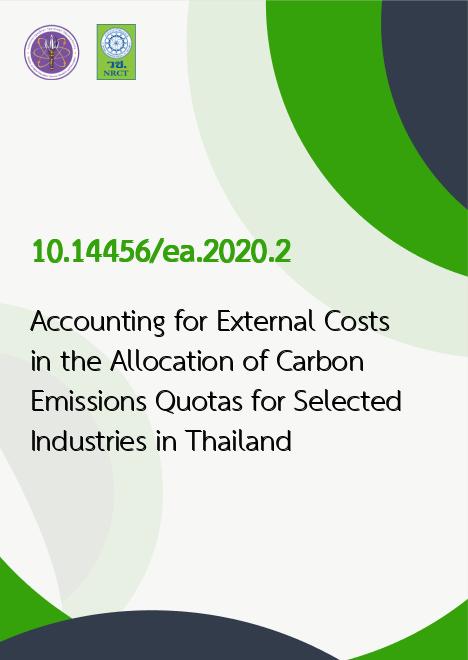
|
Accounting for External Costs in the Allocation of Carbon Emissions Quotas for Selected Industries in Thailand |
|---|---|
| รหัสดีโอไอ | |
| Creator | 1. Isaree Jirajariyavech 2. Sompote Kunnoot 3. Krit Iemthanon |
| Title | Accounting for External Costs in the Allocation of Carbon Emissions Quotas for Selected Industries in Thailand |
| Publisher | Thai Society of Higher Education Institutes on Environment |
| Publication Year | 2563 |
| Journal Title | EnvironmentAsia |
| Journal Vol. | 13 |
| Journal No. | 1 |
| Page no. | 14-25 |
| Keyword | Optimal allocation, Equi-marginal principle, Economic cost |
| URL Website | http://www.tshe.org/ea/index.html |
| Website title | EnvironmentAsia |
| ISSN | 1906-1714 |
| Abstract | This study aims to account for the external economic impact costs to allocated an optimal carbon dioxide emissions quota system in the Thailand ETS. The focus industries were the highly intensive energy sectors including electricity, petrochemicals, cement, iron and steel, and aviation. The economic impact is computed in terms of the combined strength of forward and backward linkages measured by Leontiefีs inverse produced by the input-output (I-O) model. The calculation of the difference of Economic Impact ะ Emission Ratio (EIER) for industries indicated the differences in the ratio of change in economic impact as a result of one additional unit of carbon dioxide emissions reduction. The results show that economic efficiency and optimal allocation of carbon dioxide emissions quotas can be achieved using the equi-marginal method. The results suggest that total economic costs of approximately 10.78% can be saved by implementing this optimal emissions quota allocation method. Moreover, the electricity sector should be allocated a larger quota than the other four industries. |